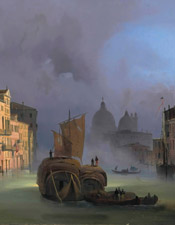Travels in Italy
, translated by Kline, A. S. (contact-email)
In 1850, Théophile Gautier travelled through Italy from Milan to Rome and Naples. The feuilletons he penned both during and after his expedition were originally published in La Presse and Le Pays, before being later collected in his 1852 travelogue, Voyage en Italie. His account focuses predominantly on Northern Italy, since Rome and the south are absent, and Florence is treated in brief only in the last section. Gautier combines the admiration of an art lover for some of Italy's most renowned monuments with sharp observations on the everyday life and landscapes of contemporary Italy.
The narrative focuses on Venice, which Gautier claimed as one of the three cities of his dreams, namely Granada, Venice and Cairo. Gautier reshapes the dark, romanticised image of Venice into a more contemporary perspective, touching on themes such as Austrian occupation. Originally titled Italia, this work became both a guide for 19th-century travellers and a landmark in Gautier’s literary legacy.
This enhanced translation has been designed to offer maximum compatibility with current search engines. Among other modifications, the proper names of people and places, and the titles given to works of art, have been fully researched, modernised, and expanded; comments in parentheses have been added here and there to provide a reference, or clarify meaning; and minor typographic or factual errors, for example incorrect attributions and dates, in the original text, have been eliminated from this new translation.

Kline, A. S.
Support Open-Access:
Your contribution keeps our classical translations available to all. Every dollar helps support classics education and funds the expansion of our catalogue. Value what we do? Donate now.
File Downloads:
© Copyright, All Rights Reserved. This work may be freely reproduced, stored and transmitted, electronically or otherwise, for any non-commercial purpose. Conditions and Exceptions apply.